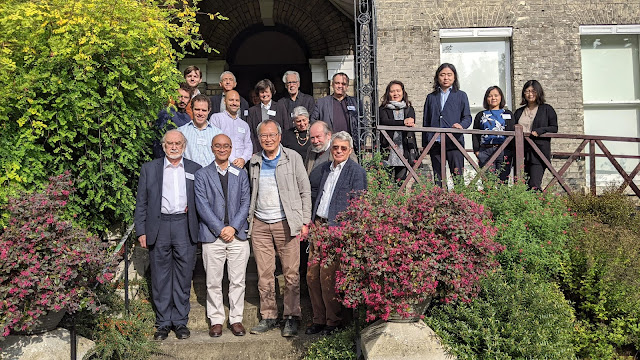On 8–9 October 2021, the Needham Research Institute, the Ancient India and Iran Trust, and the Faculty of Asian and Middle Eastern Studies, University of Cambridge, jointly organised a workshop on ‘China, India, and Iran: Scientific exchange and cultural contact through the first millennium CE’. The event was first proposed by Bill Mak in 2019 when he was the Ho Peng Yoke Fellow of History of Science at the Needham Research Institute, and was due to take place in October 2020 after receiving the support of the three organising partners and the generous sponsorship of the Glorison Network and the Tsz Shan Monastery in Hong Kong. Postponed for a year because of the Covid-19 pandemic, the two-day workshop, held at Needham Research Institute and the Ancient India and Iran Trust on its first and second day respectively, revived the convivial, social atmosphere that is an integral part of the identity of the two institutes. This was aided by the bright and warm weather, which enabled participants to enjoy both the garden and the lecture venues.
The workshop began with a keynote lecture by Professor Sam Lieu FBA: ‘From Qin to Cathay – Names for China and the Chinese on the Silk Road’. Over the two days, fifteen speakers from Cambridge, Oxford, and SOAS covered an wide range of topics from religion and ancient codices to astronomy and the transmission of metallurgical recipes and aromatics across Eurasia. (Regrettably Nicholas Sims-Williams was unable to join us due to a recent injury). The cross-disciplinary, plurilingual, transcultural content, discussion provided by the six discussants (Mei, Galambos, Hunter, Mak in lieu of Sims-Williams, Barrett, and de Blois), and the collaborative organisation of the event contributed to its richness, offering new insights to its participants in terms of the interconnectivity of the three ancient, neighbouring cultures: China, India, and Iran. Due to the limitation of the venues and consideration for social-distancing, both venues accommodated no more than thirty participants at any time. However, nearly 100 online partcipants, mostly researchers and students affiliated with universities around the world, were able to join the event at some point through Eventbrite and Zoom live-streaming of the lectures.
Online program of the workshop: HERE
Programme booklet (pdf, 16.8 MB): HERE








No comments:
Post a Comment